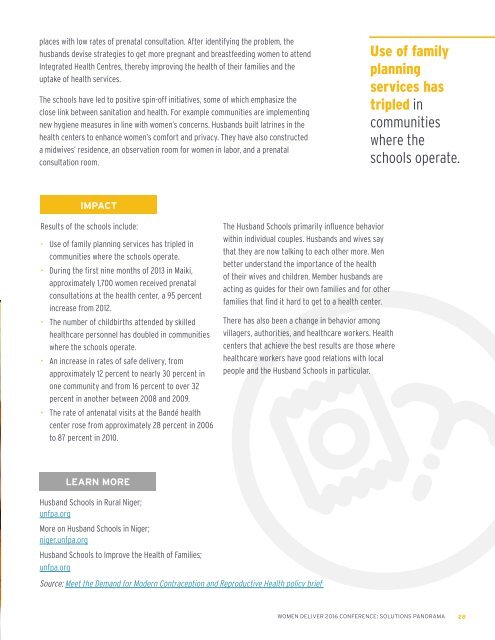Solutions Panorama
A collection of 100 programs, initiatives, and strategies that were shared at the Women Deliver 2016 Conference.
A collection of 100 programs, initiatives, and strategies that were shared at the Women Deliver 2016 Conference.
You also want an ePaper? Increase the reach of your titles
YUMPU automatically turns print PDFs into web optimized ePapers that Google loves.
places with low rates of prenatal consultation. After identifying the problem, the<br />
husbands devise strategies to get more pregnant and breastfeeding women to attend<br />
Integrated Health Centres, thereby improving the health of their families and the<br />
uptake of health services.<br />
The schools have led to positive spin-off initiatives, some of which emphasize the<br />
close link between sanitation and health. For example communities are implementing<br />
new hygiene measures in line with women’s concerns. Husbands built latrines in the<br />
health centers to enhance women’s comfort and privacy. They have also constructed<br />
a midwives’ residence, an observation room for women in labor, and a prenatal<br />
consultation room.<br />
Use of family<br />
planning<br />
services has<br />
tripled in<br />
communities<br />
where the<br />
schools operate.<br />
IMPACT<br />
Results of the schools include:<br />
• Use of family planning services has tripled in<br />
communities where the schools operate.<br />
• During the first nine months of 2013 in Maiki,<br />
approximately 1,700 women received prenatal<br />
consultations at the health center, a 95 percent<br />
increase from 2012.<br />
• The number of childbirths attended by skilled<br />
healthcare personnel has doubled in communities<br />
where the schools operate.<br />
• An increase in rates of safe delivery, from<br />
approximately 12 percent to nearly 30 percent in<br />
one community and from 16 percent to over 32<br />
percent in another between 2008 and 2009.<br />
• The rate of antenatal visits at the Bandé health<br />
center rose from approximately 28 percent in 2006<br />
to 87 percent in 2010.<br />
The Husband Schools primarily influence behavior<br />
within individual couples. Husbands and wives say<br />
that they are now talking to each other more. Men<br />
better understand the importance of the health<br />
of their wives and children. Member husbands are<br />
acting as guides for their own families and for other<br />
families that find it hard to get to a health center.<br />
There has also been a change in behavior among<br />
villagers, authorities, and healthcare workers. Health<br />
centers that achieve the best results are those where<br />
healthcare workers have good relations with local<br />
people and the Husband Schools in particular.<br />
LEARN MORE<br />
Husband Schools in Rural Niger;<br />
unfpa.org<br />
More on Husband Schools in Niger;<br />
niger.unfpa.org<br />
Husband Schools to Improve the Health of Families;<br />
unfpa.org<br />
Source: Meet the Demand for Modern Contraception and Reproductive Health policy brief<br />
WOMEN DELIVER 2016 CONFERENCE: SOLUTIONS PANORAMA 28



